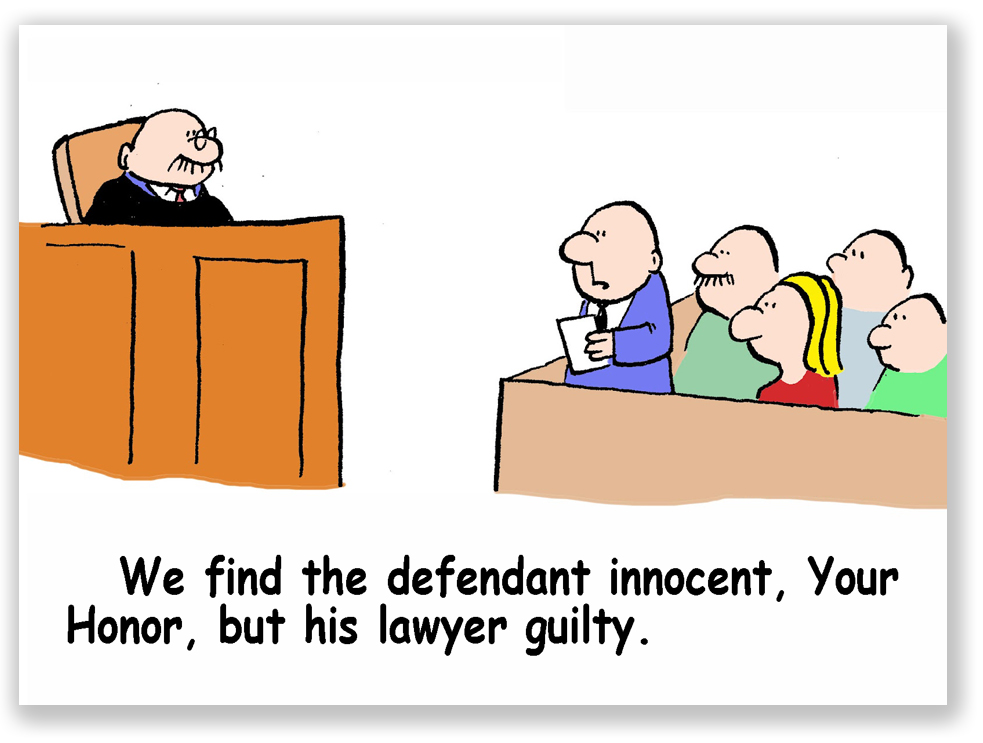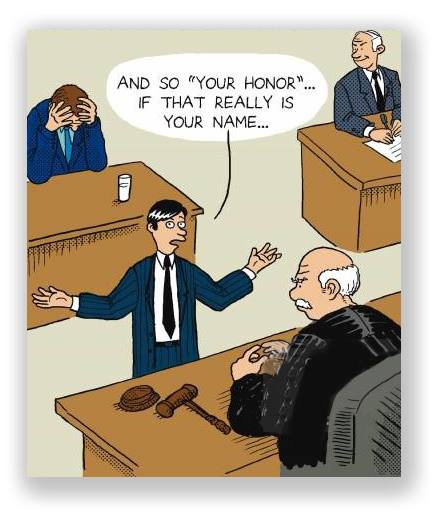We’re still doing a weekly newsletter … we’re just posting pieces of it every day. The news is fresher this way …
BAD JUDGE, BAD LAWYER
 It sounds more like juvenile court than a federal criminal trial. An attorney and judge going at it hammer-and-tong, the judge remonstrating the lawyer for “misleading questions,” admonishing counsel to “do your homework,” and telling him to “shut up and sit down.” And when all that failed, the court – in the presence of the jury – directed a U.S. Marshal Service deputy to forcibly place the attorney in his chair (if not in his place).
It sounds more like juvenile court than a federal criminal trial. An attorney and judge going at it hammer-and-tong, the judge remonstrating the lawyer for “misleading questions,” admonishing counsel to “do your homework,” and telling him to “shut up and sit down.” And when all that failed, the court – in the presence of the jury – directed a U.S. Marshal Service deputy to forcibly place the attorney in his chair (if not in his place).
Too many judicial highjinks for due process to tolerate? Not so, the 1st Circuit said told unlucky defendant Rene Márquez-Perez on Tuesday. The Court of Appeals held that, but for the chair-seating incident, the trial judge was well within his discretion in how he controlled his courtroom.
The forcible seating came when the government objected to a defense question. The defense attorney, brash but not too bright (see below), objected to the government’s objection. After he interrupted the court and prosecutor repeatedly, even after the judge explained that you can’t object to an objection, the judge exploded, “Sit down and shut up. Sit down and shut up while he makes his objection.” When counsel was too obtuse to concede, the judge ordered, “Sit down. Sit down, Mr. Burgos. Marshal, have him sit down.”
The 1st Circuit agreed that forcing the lawyer into his chair stepped over the line. The panel noted that “the trial judge did not command force to counter a physical threat or else as a last resort. Rather, he directed the security officer to forcibly seat counsel to resolve a verbal dispute that had erupted just moments earlier. The judge did so in the presence of the jury, and without first exhausting other options, such as removing the jury and pronouncing a stern warning of sanction or contempt. Under these circumstances, the judge used force not as a last resort, but nearly as a first one. We are not indifferent to the difficult task that a trial judge sometimes faces in maintaining control of a courtroom, nor to the reality that a judge’s demeanor while exercising that control will not always project unruffled serenity. On this record, however, we conclude that the judge’s speedy resort to use of force was not consistent with the very purpose of a court system to adjudicate controversies. . . in the calmness and solemnity of the courtroom according to legal procedures.”

Nevertheless, the judge’s over-reaction to defense counsel’s courtroom conduct did not require a new trial. The appellate panel said the trial judge’s resort to the Marshals “carried no suggestion that the defense case was weak or that the judge sided with the prosecutor.” While the error did take place in the jury’s presence, it “did not affect critical evidence, or otherwise deter Márquez from presenting his case; indeed, the judge eventually overruled the government’s objection in favor of Márquez.”
All was not lost for defendant Márquez, however. He complained that if his lawyer had shown him the government’s video evidence before trial, he would have pled guilty. Márquez did not benefit from counsel’s advice about the videos because counsel had not watched them, either: although counsel could have done so, he admitted to the district judge that he “decided not to see them, for the record.” Arguing that his lawyer was ineffective – in part because of this foolish record admission – Márquez asked that his conviction be vacated so he could from the government’s plea deal he had previously rebuffed.
Instances where a direct appeal wins a remand for ineffective assistance of counsel are very unusual. Courts typically deny ineffectiveness claims on direct appeal “due to an insufficiently developed record, leaving defendants to bring a collateral attack under 28 U.S.C. § 2255.” However, the panel said, “in rare cases where the record is sufficiently developed, we may resolve the claim on direct appeal. Moreover, even on an inchoate record, we will sometimes remand for an evidentiary hearing where the defendant has identified in the record sufficient indicia of ineffectiveness.”
Here, the 1st said Márquez had identified “sufficient signs of ineffectiveness” to justify a remand for an evidentiary hearing. “Here,” the Court said, “counsel’s failure to watch the videos appears to fall below [the] standard. First, counsel knew that the government probably would rely on the videos because the government formally designated the videos as evidence-intended-for-trial Counsel’s failure to watch the videos was exacerbated by his own beliefs, as expressed in a motion that he filed, that the videos contained exculpatory evidence. Second, the videos were easily accessible because the government produced them in discovery, presenting most of the videos to the defense two months before trial.”
The Court found evidence Márquez was prejudiced by counsel’s failing, because there was indication that “but for his attorney’s deficient performance, he would have pled guilty and received a lesser sentence.”
United States v. Márquez-Perez, Case No. 14-2246 (1st Cir. Aug. 30, 2016)

